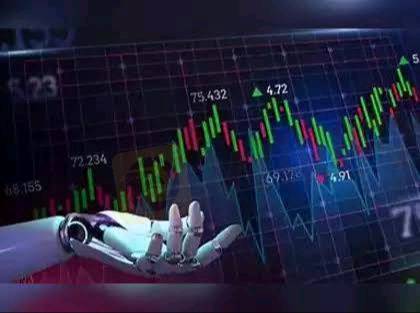
2025-02-28 20:01
Industry#AITradingAffectsForex
AI-driven forex volatility modeling based on real-time news feeds
Okay, let's break down what "AI-driven forex volatility modeling based on real-time news feeds" means, in a way that's easy to understand.
Imagine the forex market like a big, busy playground where different countries' money is being traded. "Volatility" is like how much the kids on the playground are running around and changing places. If they're running everywhere, it's high volatility; if they're mostly sitting still, it's low volatility.
Here's how AI and news feeds come into play:
* Forex Market:
* This is where currencies (like the U.S. dollar, the Euro, etc.) are bought and sold.
* The value of these currencies changes constantly.
* Volatility:
* This refers to how much and how quickly those currency values change.
* High volatility means big, sudden changes.
* Low volatility means smaller, more gradual changes.
* Real-Time News Feeds:
* These are like constant streams of up-to-the-minute information.
* They include things like:
* Economic news (like reports on how a country's economy is doing).
* Political events (like elections or big government decisions).
* World events (like natural disasters or global crises).
* AI (Artificial Intelligence):
* Think of AI as a super-smart computer program.
* It can:
* Read and understand huge amounts of news very quickly.
* Find patterns and connections in the news that humans might miss.
* Use those patterns to predict how the forex market might react.
* AI-Driven Forex Volatility Modeling:
* This means using AI to predict how much the forex market is likely to move (its volatility).
* The AI does this by analyzing real-time news feeds.
* For example, if the AI reads news that a country's economy is doing poorly, it might predict that the country's currency will become more volatile.
In simpler terms, AI helps traders understand how news events might affect currency values, so they can make better decisions.
Here's a simplified example:
* News: "Country X's central bank just announced a surprise interest rate change."
* AI: "This type of news usually causes high volatility in Country X's currency."
* Trader: "Okay, I'll be prepared for big swings in that currency's value."
It's important to remember that:
* The forex market is complex and can be unpredictable.
* Even with AI, there are no guarantees.
I hope this helps!
Like 0
FX5789672202
Trader
Hot content
Industry
Event-A comment a day,Keep rewards worthy up to$27
Industry
Nigeria Event Giveaway-Win₦5000 Mobilephone Credit
Industry
Nigeria Event Giveaway-Win ₦2500 MobilePhoneCredit
Industry
South Africa Event-Come&Win 240ZAR Phone Credit
Industry
Nigeria Event-Discuss Forex&Win2500NGN PhoneCredit
Industry
[Nigeria Event]Discuss&win 2500 Naira Phone Credit
Forum category

Platform

Exhibition

Agent

Recruitment

EA

Industry

Market

Index
#AITradingAffectsForex
 India | 2025-02-28 20:01
India | 2025-02-28 20:01AI-driven forex volatility modeling based on real-time news feeds
Okay, let's break down what "AI-driven forex volatility modeling based on real-time news feeds" means, in a way that's easy to understand.
Imagine the forex market like a big, busy playground where different countries' money is being traded. "Volatility" is like how much the kids on the playground are running around and changing places. If they're running everywhere, it's high volatility; if they're mostly sitting still, it's low volatility.
Here's how AI and news feeds come into play:
* Forex Market:
* This is where currencies (like the U.S. dollar, the Euro, etc.) are bought and sold.
* The value of these currencies changes constantly.
* Volatility:
* This refers to how much and how quickly those currency values change.
* High volatility means big, sudden changes.
* Low volatility means smaller, more gradual changes.
* Real-Time News Feeds:
* These are like constant streams of up-to-the-minute information.
* They include things like:
* Economic news (like reports on how a country's economy is doing).
* Political events (like elections or big government decisions).
* World events (like natural disasters or global crises).
* AI (Artificial Intelligence):
* Think of AI as a super-smart computer program.
* It can:
* Read and understand huge amounts of news very quickly.
* Find patterns and connections in the news that humans might miss.
* Use those patterns to predict how the forex market might react.
* AI-Driven Forex Volatility Modeling:
* This means using AI to predict how much the forex market is likely to move (its volatility).
* The AI does this by analyzing real-time news feeds.
* For example, if the AI reads news that a country's economy is doing poorly, it might predict that the country's currency will become more volatile.
In simpler terms, AI helps traders understand how news events might affect currency values, so they can make better decisions.
Here's a simplified example:
* News: "Country X's central bank just announced a surprise interest rate change."
* AI: "This type of news usually causes high volatility in Country X's currency."
* Trader: "Okay, I'll be prepared for big swings in that currency's value."
It's important to remember that:
* The forex market is complex and can be unpredictable.
* Even with AI, there are no guarantees.
I hope this helps!
Like 0
I want to comment, too
Submit
0Comments

There is no comment yet. Make the first one.

Submit
There is no comment yet. Make the first one.